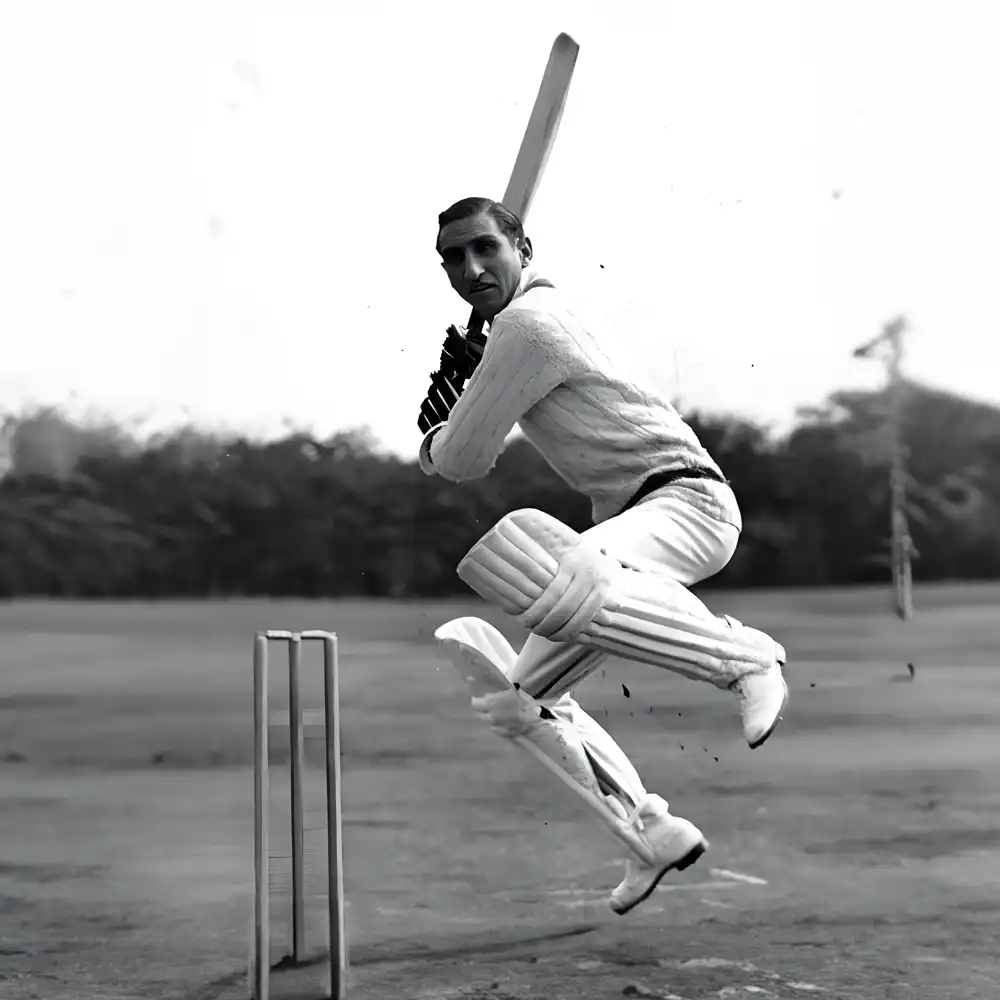

Tiger Pataudi: Triumph Over Adversity
Nawab Mohammad Mansoor Ali Khan Siddiqui Pataudi was born on January 5, 1941 in Bhopal India, into the distinguished and illustrious Pataudi family. On the field, Pataudi earned the nickname of Tiger, becoming Tiger Pataudi due to his aggressive play style on the cricket field. Despite the life-altering accident at a young age of 20, Pataudi’s determination and exceptional cricketing skills allowed him to overcome the odds and excel in the sport.
Following the Footsteps of a Cricketing Legacy
Tiger Pataudi’s journey in cricket was deeply influenced by his father, Iftikhar Ali Khan Pataudi, the eighth Nawab of Pataudi. He was a prominent figure in both Indian cricket and their esteemed family, who represented both England and India in Test matches during the 1930s and 1940s. He was a skilled batsman as well as respected captain, leading India in several matches.
Growing up in a family with such a distinguished cricketing legacy, Tiger was exposed to cricket from an early age. His father’s love and achievements in cricket inspired him to follow in his footsteps. From listening to his father’s cricket stories to watching him play, Tiger developed a deep passion for the sport, and the desire to emulate his father’s success on the cricket field became a driving force in his life. As a child, Tiger spent hours honing his cricketing skills, mentored by his father. Iftikhar mentored his son and provided valuable insights and guidance on cricketing techniques and tactics. His father’s influence shaped his game as well as instilled values such as sportsmanship, determination, and leadership.
The tragic car accident that cost Tiger his right eye could have been a career-ending setback for many, but his father’s unwavering support and encouragement helped him overcome this challenge. Iftikhar Ali Khan Pataudi’s belief in his son’s abilities and assurance that he could still excel in cricket despite the loss instilled Tiger with the confidence to continue pursuing his dreams.
The Life-Altering Accident
A month prior to his Test debut for India in July 1961, Tiger Pataudi suffered a life-altering accident that impacted his cricketing journey. He had been traveling from Delhi to Madras with his friends when their car collided with another vehicle, resulting in severe injuries to Tiger’s eye.
Tiger suffered a permanent loss of vision in his right eye, posing a major challenge for the 20-year old cricketer. The loss of an eye raised doubts about his future in cricket as well as caused questions on his ability to pursue the sport at the highest level. Tiger’s indomitable spirit and love for cricket propelled him forward despite the grim prognosis and immense physical and emotional toll. The road to recovery required immense courage and perseverance. With the support of his family and well-wishers, Tiger underwent intensive treatment and rehabilitation to adapt to his new circumstances. He had to relearn certain aspects cricket, including adjusting his batting stance and altering his fielding techniques due to loss of depth perception.
Iftikhar’s unwavering belief in his father’s abilities, assurance, and encouragement from his father bolstered his confidence. Tiger’s remarkable comeback showcased his resilience and the mental strength needed to thrive in the face of adversity. He demonstrated that talent, determination, and the passion for the game could triumph over physical setbacks.
The Resilient Return
Tiger Pataudi’s journey back to cricket after the tragic accident was extraordinary, made possible due to his determination and unyielding spirit. Despite losing his right eye, Tiger was determined not to let the setback define his cricketing career. With the encouragement and support of his father, Iftikhar Ali Khan Pataudi, and his family, he set out to prove that he could still excel in the sport he loved.
Tiger meticulously worked on refining his batting technique and he made subtle adjustments to his stance and footwork, to compensate the loss of depth perception. His dedication and hard work were evident as he embraced the challenge. Other than overcoming the technical aspect, Tiger’s mental strength was crucial to his return to cricket due to his ability to focus on the game.
Tiger’s return to the cricketing arena was met with curiosity and admiration from the community, fans and fellow players alike. The world watched in awe as he donned the Indian jersey, ready to take on the challenges of international cricket with only one functional eye. His performances on the field spoke volumes about his talent and passion for the sport. He proved that cricketing prowess was not confined to physical attributes alone, but also in the unwavering love for the game.
Tiger Pataudi’s comeback was an inspiration to millions around the world, becoming a symbol of courage, resilience, and determination. It proved that setbacks could be transformed into stepping stones towards greater success. Tiger’s return also had a significant impact on the morale of the Indian cricket team. As their captain, his leadership style and charisma had a unifying effect, motivating the players to give their best on the field.

A Showcase of Talent: Rohit’s Standout Performances
Life and Legacy after the Return:
Following his triumphant return to the cricket field after the tragic accident, Tiger Pataudi continued to leave a mark on Indian cricket and the world of sports. His life and legacy were characterized by his exceptional leadership, his unwavering passion for the game, and his impact beyond the boundary ropes.
As the captain of the Indian cricket team, Tiger led by example, inspiring his teammates to perform at their best. His visionary approach to the game, coupled with his ability to remain calm under pressure, made him one of India’s most successful captains. Under his leadership, the team achieved significant victories, and his contributions were instrumental in shaping the team’s identity and style of play.
Beyond his captaincy, Tiger Pataudi was a true ambassador for the sport, with his charismatic personality and sportsmanship. Due to this, he was a beloved figure not only in India but also on the global cricketing stage. He was respected and admired by cricketers and fans alike, due to his skills and conduct both on and off the field. Tiger was a source of inspiration due to the journey and triumph over adversity.
Throughout his life, Tiger Pataudi remained actively involved in the promotion and development of cricket. His insights and experience were sought after by cricket boards and committees, and he continued to contribute to the growth of the sport he loved.
Tiger Pataudi’s legacy extended beyond his cricketing career. He was a true icon who transcended generations, leaving behind a lasting impact on Indian cricket and inspiring cricketers to uphold the values of sportsmanship, courage, and determination.
Captaincy and Leadership
At the age of 21, Pataudi became the youngest Test captain in history when he was appointed as the captain of the Indian cricket team. Under his leadership, India achieved several notable victories, including their first overseas Test series win in 1967-68.
Pataudi’s visionary approach introduced aggressive and attacking cricket strategies to the Indian team, inspiring his players to play with confidence and determination.
Legacy and Post-Cricket Contributions
Throughout his international cricket career, which spanned from 1961 to 1975, Pataudi played 46 Test matches for India. He scored over 2700 runs in Test cricket, including six centuries, with an impressive batting average.
His contributions to Indian cricket earned him accolades and admiration from cricket enthusiasts across the globe. Post-retirement, Pataudi remained deeply involved in the sport as a cricket commentator and administrator, continuing to contribute his expertise and insights to the game he loved. His legacy as a true cricketing icon, a visionary leader, and a courageous individual who overcame adversity continues to inspire generations of cricketers and fans alike.
On September 22, 2011, at age 70, Tiger Pataudi’s journey came to an end when he passed away. His demise was met with an outpouring of grief and tributes from the cricketing fraternity, fans, and dignitaries from around the world. The legacy of Tiger Pataudi lives on through the many lives he touched and the impact he made on the sport of cricket.
Family Background and Marriage
Tiger Pataudi hailed from a family with rich ties to both royalty and cricketing excellence. His father’s illustrious cricketing career and the esteemed status of his family laid a solid groundwork for his own journey in the sport. In March 1969,
Pataudi tied the knot with the acclaimed Bollywood actress Sharmila Tagore, becoming a dynamic and iconic couple adored by people nationwide. The couple was blessed with three children – two sons, Saif Ali Khan and Soha Ali Khan, who followed their passions into the film industry, and a daughter, Saba Ali Khan, who achieved recognition as a renowned jewelry designer. He embraced his responsibilities as a husband and father with the same dedication he showed on the cricket field, cherishing his family and balancing his roles with utmost care.
As the years go by, Tiger Pataudi’s name and his contributions to Indian cricket continue to be cherished and celebrated. His life story is a testament to the transformative power of sports and serves as a reminder that a true champion is not merely defined by their victories on the field but also by the way they touch the lives of others and leave an enduring legacy that transcends time.

The Life-Altering Accident
Latest News
De Bruyne,Halaand, Messi top UEFA Player of the year
New Zealand To Tour Bangladesh for Three ODIs
Dambulla Aura reaches LPL finals against Galle
Neymar Credits Ronaldo for Saudi League Change
Pro Kabbadi League Season 10 Begin in December 2
– Advertisement –
– Advertisement –
– Advertisement –
– Advertisement –
– Advertisement –